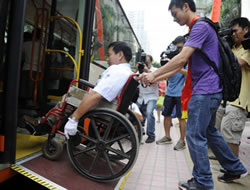 Shanghai City Council has introduced new regulations aimed at making the Chinese city ‘barrier-free’ for elderly and disabled citizens.
Shanghai City Council has introduced new regulations aimed at making the Chinese city ‘barrier-free’ for elderly and disabled citizens.
The regulations, which come into effect in June, replace all other rules relating to the environment for vulnerable people.
An official with the Shanghai Disabled Persons’ Federation, Wang Haidong, said ‘barrier-free’ referred to an environment where disabled, sick or elderly people and children could take public transport, communicate and receive social services independently and safely.
”The new regulations are a leap forward toward a barrier-free society,” Mr Wang said.
He said Shanghai began its construction of a barrier-free environment in the 1980s, involving major streets and new buildings.
Mr Wang said that after 2010, this was expanded to areas such as information, public services and other areas of people’s daily lives.
“The old regulations lag behind in terms of construction standards and cannot satisfy current demand,” Mr Wang said.
“The new regulations are more practical and detailed and raise the fines for damaging barrier-free facilities,” he said.
The regulations stipulate that Government service portals and websites must now provide barrier-free information and communication services.
Public parking lots and parking lots at large residential complexes must set up barrier-free parking spaces with signs for the disabled.
Tourist attractions and public cultural facilities such as museums, art galleries and cinemas must provide barrier-free services such as wheelchairs, audio guides or sign language for the disabled.
Medical treatment institutions must provide priority services such as registration and guidance for the disabled and seniors and they are encouraged to open barrier-free clinics for people with hearing and visual impairment.
Staff at public facilities must make access easier for people with guide dogs, and libraries must establish reading rooms for people with visual impairment, and provide books in braille and audio materials.
Shanghai, 14 April 2021











